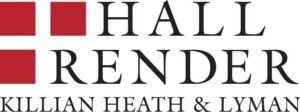
The DFW Hospital Council posts guest blogs by Associate Members. The following was provided by Hall Render. The firm’s COVID-19 Resource Center can be found here.

In April 2020, Hall Render published an article detailing state statutory, administrative and common law directives guiding commercial eviction and foreclosure actions during the COVID-19 pandemic.
Two months later, the pandemic has far from subsided with many states reporting rising rates of new cases and experts predicting a second wave sometime in the fall, yet many of these directives have expired. As of the date of this article, only a handful of states still have statewide commercial eviction moratoria, each of which are listed below:
• Connecticut: The Supreme Court stayed the service of all issued orders on evictions an ejectments until August 1, 2020.
• Illinois: Executive Order No. 2020-44 extended a moratorium on evictions until July 26, 2020.
• Maine: Executive Order No. 40 FY 19/20 provides a moratorium on all evictions based on rent nonpayment caused by COVID-19. It expires 30 days after the state COVID-19 emergency declaration is terminated.
• Maryland: Executive Order No. 20-04-03-01 provides a moratorium on all evictions if the tenant can show a substantial loss of income due to COVID-19. It remains in effect until the state of emergency declaration is terminated.
• Massachusetts: A moratorium (imposed by the newly enacted H.4647) provides that eviction may not be served on a “small business” tenant, as defined in the law. This provision will remain in effect until the sooner of August 18, 2020 or 45 days after the governor ends the state COVID-19 declaration.
• New York: Executive Order No. 28 provides that no eviction proceedings, based on rent nonpayment caused by COVID-19, may be initiated against a commercial tenant until August 19, 2020.
• Oregon: The newly enacted HB 4213 provides that no eviction proceedings for nonpayment may be initiated until September 30, 2020 and that commercial tenants have until March 31, 2021 to correct any nonpayment.
• Pennsylvania: Based on an executive order, all eviction proceedings based on nonpayment are stayed until July 10, 2020.
In the absence of a statewide directive barring commercial eviction actions, landlords and tenants should still consider the following questions:
1. Do any local restrictions bar commercial evictions?
In the absence of a statewide directive, some municipalities have enacted similar commercial eviction directives. For example, Florida’s judicial statewide eviction moratorium expired on June 30, 2020, but officials in Broward and Miami-Dade counties imposed their own eviction restrictions thereafter. In California, Executive Order No. 28-20 (extended by No. 71-20) provides that local governments may impose commercial eviction moratoria at their discretion. Similarly, in Colorado, Hawaii and Ohio, among others, district court systems have broad discretion in deciding what kind of cases they hear.
2. Is there any pending legislation addressing commercial evictions during the COVID-19 pandemic?
While states traditionally address commercial eviction directives through executive orders from their governors, at least two states (Massachusetts and Oregon) passed legislation codifying those protections. Although the language of these bills largely track the terms of the statewide executive orders, memorializing those protections in the state code likely makes them more difficult to rescind and, as a result, provides greater protections for tenants. Legislation may also be the more appropriate mechanism for regulating commercial evictions if state law does not grant the governor or other state officials the authority to execute such a directive.
3. Where states permit commercial evictions, what court rules guide eviction actions?
In other states where the statewide ban of commercial evictions expired or was rescinded, courts heightened pleading requirements for eviction actions. Courts in states like North Carolina, Texas and Oklahoma now require landlords to affirmatively plead that their building is not covered by the CARES Act and thus barred from bringing an eviction action until July 25, 2020. In some states with eviction protections, like Maryland, the tenant seeking relief must provide documentation of their COVID-19-related losses. Although these directives do not outright ban filing commercial evictions or executing eviction orders, they make litigating these cases more difficult for landlords.
* * *
The foregoing considerations will be increasingly important as more statewide commercial directives expire or are rescinded. Although much of the current national narrative as to evictions focuses on increasing rates of residential evictions (and rightfully so), commercial landlords and tenants should expect and prepare for a similar surge in health care real estate. A recent Texas survey, for example, found that more than 2/3 of physicians reported their patient volume has reduced by at least 50% since the pandemic began. These significant reductions in patient volumes will inevitably affect these physicians’ revenues and their ability to meet their existing financial obligations. Health care landlords and tenants should carefully consider the state and local legislative, administrative and judicial directives addressing commercial evictions for lease disputes arising out of COVID-19.
If you have any questions about the information contained above, please contact:
• Addison Bradford at (317) 977-1403 or abradford@hallrender.com;
• Matt Paradiso at (248) 457-7844 or mparadiso@hallrender.com;
• Gerard Faulkner at (214) 615-2036 or gfaulkner@hallrender.com; or
• Your regular Hall Render attorney.
Special thanks to JD French, law clerk, for his assistance with preparing this article.
Hall Render – COVID-19 cases increase, commercial eviction restrictions decrease
08/10/2020